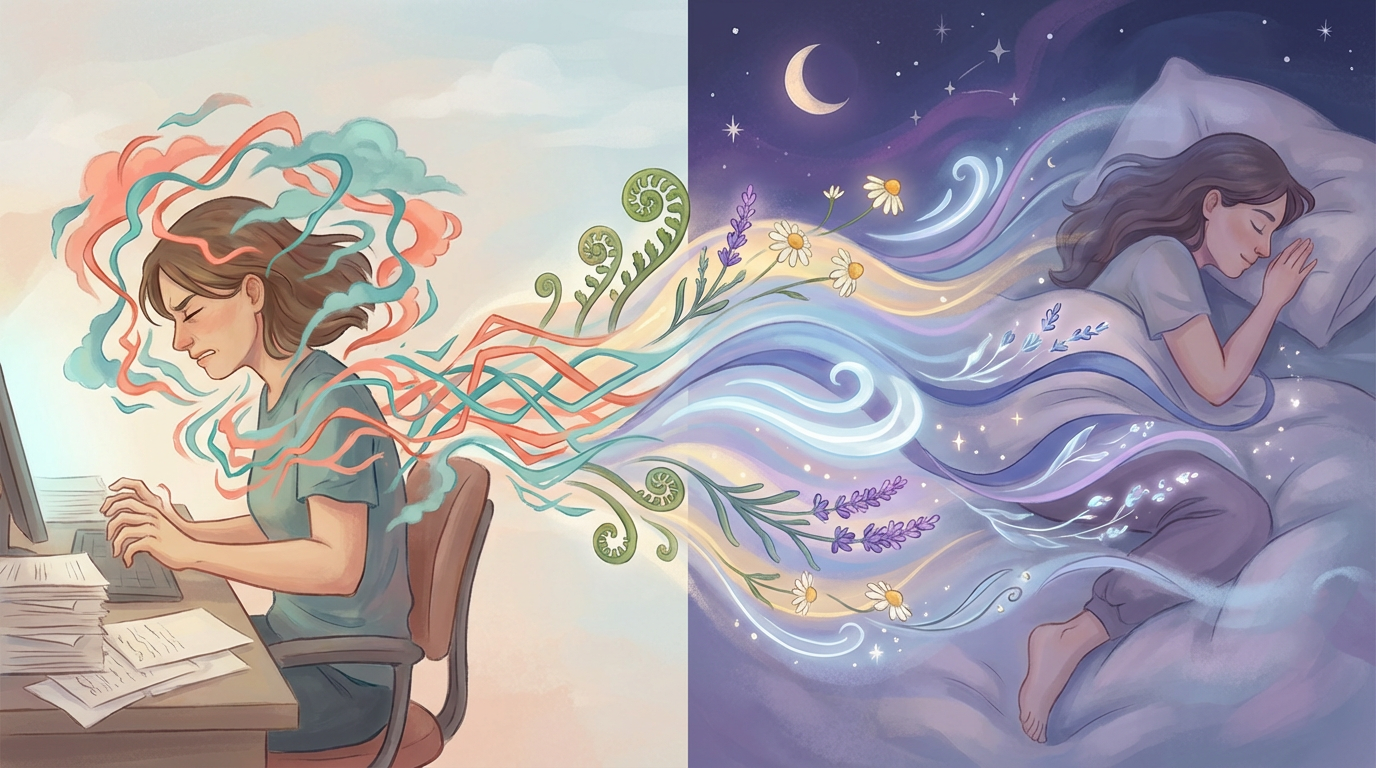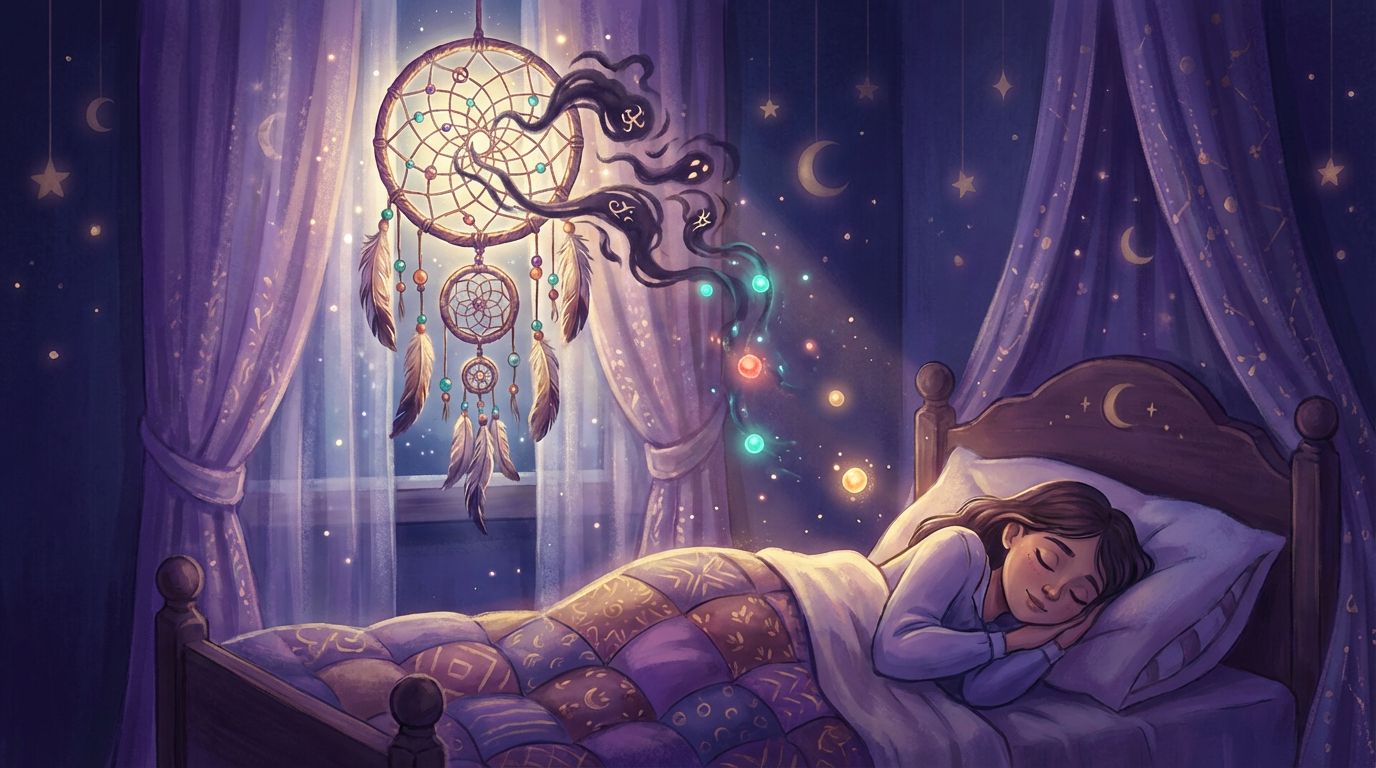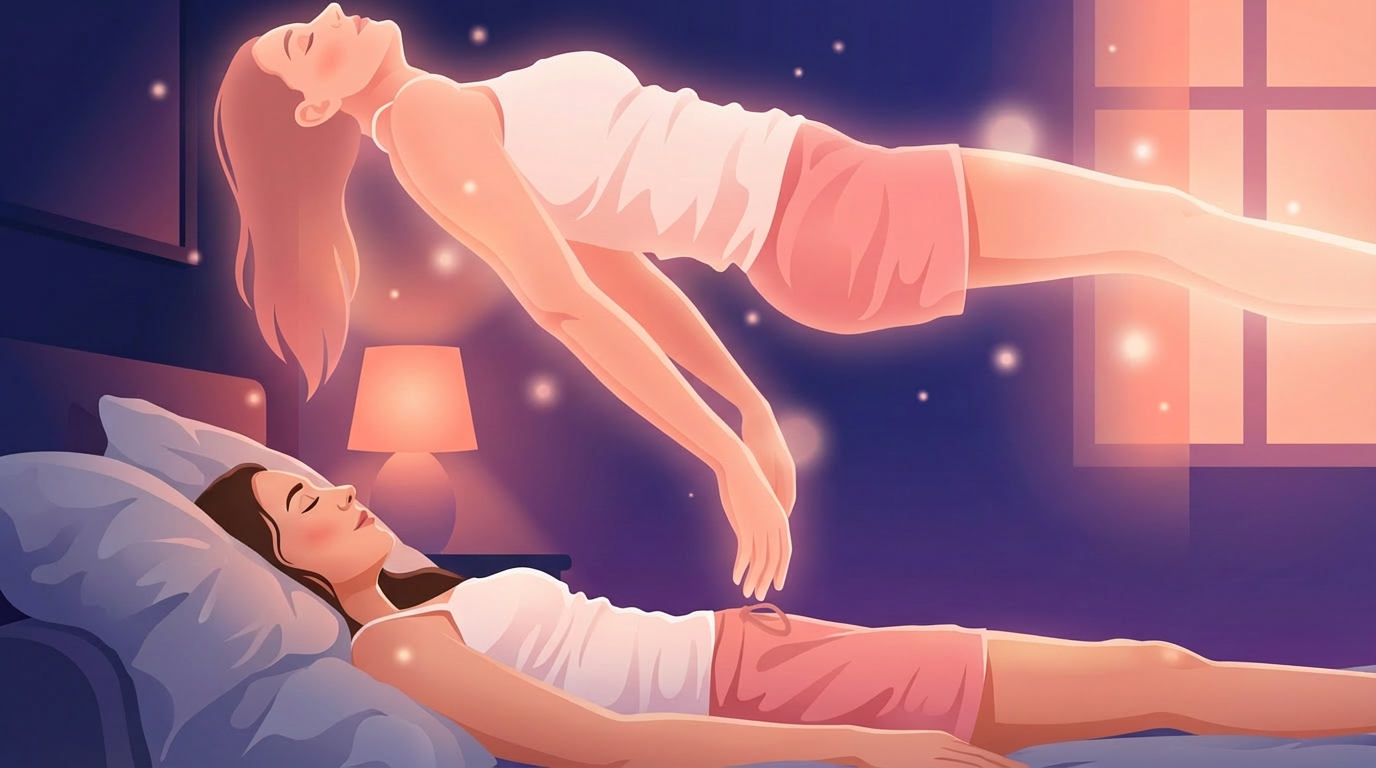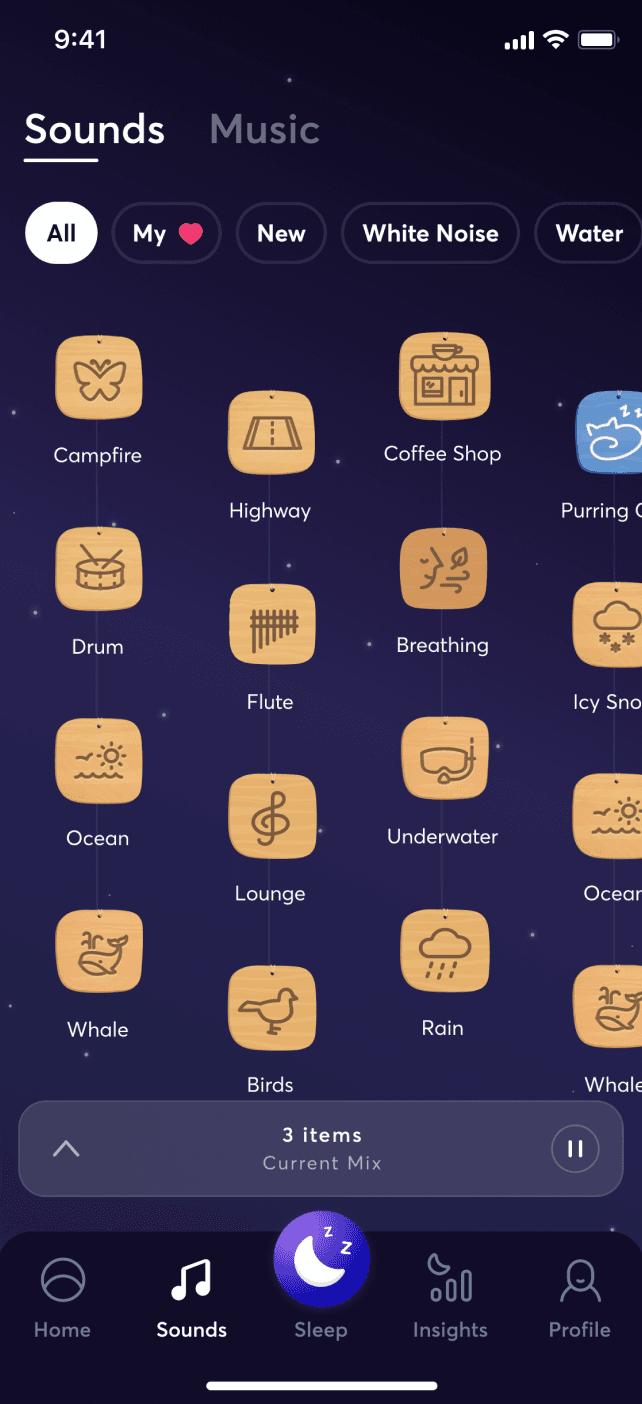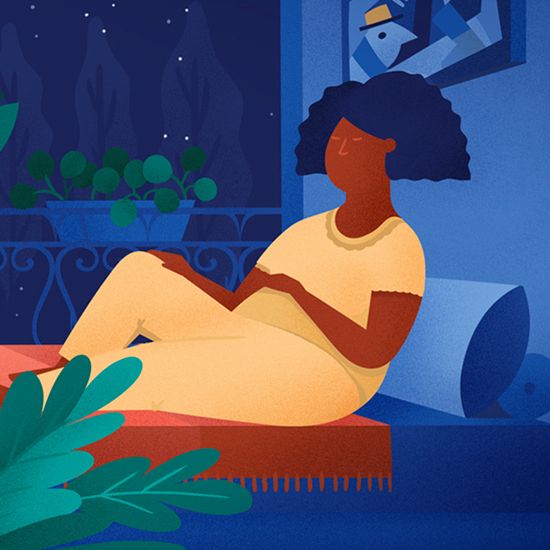
5 Herbal Tea Recipes to Relieve Anxiety and Stress
If you struggle with anxiety and stress, which often impact sleep, herbal teas may help. Take into consideration that herbal teas help take the edge off of occasional stress and anxiety. However, it’s important to remember that herbal teas are not medication.
Whether it’s physical stress on our bodies or perceived stress from psychological factors, anxiety is all around us and can take a toll on our mental, physical, and emotional well-being.
In this article, we'll be sharing:
- The effects of stress and anxiety
- The many benefits that different teas may provide, from improving sleep quality, providing stress relief, and relieving anxiety, and the best teas to help.
- Different recipes for teas that can help with anxiety, stress, and other issues.
Keep reading to learn more about how drinking tea may help you improve your health and wellness!
The Effects of Stress and Anxiety
Before we dive into the benefits of tea and the different recipes you can use for stress, anxiety, and more - we wanted to talk about how stress and anxiety affect the body. This will give you a clear understanding of how it’s a problem and why it’s important to deal with it in healthy ways.
Stress
First, let’s talk about stress. Stress affects every system in your body, this includes your:
- Respiratory system and cardiovascular system - When you’re in stress response, your body will breathe quicker to distribute oxygen-rich blood to the body. Your heart pumps faster, and blood vessels constrict. Too much stress can make your heart work for too long and hard. With this increase in blood pressure, your risk of heart attack and stroke increases.
- Nervous system and endocrine system - When hormones like adrenaline and cortisol (the stress hormone) are released, your heartbeat increases and sends blood to certain muscles, organs, and your heart. Once this stressor goes away, things should go back to normal. But if not, it will continue.
- Gastrointestinal system - When under stress, your body releases extra glucose (energy). If you’re under stress a lot, your body may not be able to keep up with the extra glucose surge. Too much stress can increase the chances of type 2 diabetes.
A few other systems affected by stress include the musculoskeletal system and the reproductive system.
Too much stress can cause:
- Insomnia
- Headaches
- Heartburn
- Low libido
- Stomach aches
- Rapid breathing
- Weakened immune system
- High blood sugar and pressure
- Increased risk of a heart attack and depression
Stress can impact your health and wellness in a variety of ways. This is why it's so important to take proper precautions to deal with it.
Anxiety
Just like stress, anxiety is a pretty normal part of life. You might experience it before a job interview or before a first date. Physical symptoms of anxiety include:
- Fatigue
- Insomnia
- Headache
- Chest pain
- Indigestion
- Abdominal pain
- Rapid breathing or heart rate
- Lightheadedness or dizziness
And anxiety doesn't come in one single form. There are many different types of anxiety - including generalized anxiety disorder, social anxiety, phobias, and even obsessive-compulsive disorder (OCD). Here are a few of the systems that anxiety may affect:
- Central nervous system - Long-term anxiety can cause your brain to release stress hormones more frequently, and in return, this can cause more headaches, dizziness, and even depression.
- Cardiovascular system - Anxiety disorders may cause chest pain, heart palpitations, and a rapid heart rate.
- Immune system - Anxiety can actually trigger your fight-or-flight response. This can release chemicals into your system, such as adrenaline - increasing your pulse and rate of breathing. This is a normal function, but if you experience chronic stress due to your anxiety, your body may rarely return to normal function, and this can increase your risk of viral infections and illnesses.


Benefits of Tea
Now that we've covered the different ways anxiety and stress affect the body, we also want to touch on the benefits that come from drinking different teas. This includes herbal teas, black tea, and more.
Whether you want to make and drink one for your own enjoyment, to relieve anxiety and stress, or even to help with a cold, tea has been used for many years as a natural remedy.
In fact, the first recording of tea dates back to the 3rd century AD China, and in that description, they talk about tea as if it’s a medicinal beverage. Here are the benefits of different teas:
White tea benefits
White tea comes from a native plant in China, and India called camellia sinensis. Research suggests that because of its high amount of antioxidants, this type of tea may actually be effective in combating different cancers.
It also contains fluoride, tannins, and catechins. [Tannins](https://pubmed.ncbi.nlm.nih.gov/9759559/#:~:text=Tannins (commonly referred to as,protein digestibility in experimental animals.) may help with protein digestibility and more. Catechin is an antioxidant, and it could lead to body fat reduction. All three components may also be good for your teeth as they make them more resistant to acid and sugar, help strengthen them, and fight plaque.
Herbal tea benefits
The main difference between herbal teas and white teas is that herbal tends to contain a blend of fruits, spices, and herbs. Here are a few benefits of the many common herbal teas out there:
- Ginger tea may help to treat chronic indigestion, and it could help to relieve joint pain that’s caused by osteoarthritis. It’s also great for fighting morning sickness.
- Hibiscus tea may actually help to lower fat levels and blood pressure. It can starve off cravings for unhealthy sweets, and it may even prevent the formation of kidney stones. This tea might also improve overall liver health.
- Rooibos tea provides relief from allergies, and it can keep hair strong and the skin healthy. It may also improve blood circulation and pressure, and it can boost good cholesterol while also lowering bad cholesterol.
- Peppermint tea can soothe an upset stomach because of the menthol it contains. It can also serve as a healthy cure for constipation, irritable bowel syndrome, and motion sickness. You may also find relief from migraines and headaches from this tea as well.
- Chamomile tea can help with muscle spasms and reduce menstrual pain. It can also help with relaxation, reducing stress, and improving sleep.
With such a vast range of benefits, it’s no wonder people love tea!
Keep an eye out for some of these ingredients later as we go through the different recipes. You’ll notice a few of the recipes contain 1 or 2 of these herbs, making them an excellent choice for specific situations and needs you may have!
Black tea benefits
Black tea uses the same leaves that are used to make green tea. The difference is the leaves are fermented and dried; this is what gives black tea its dark color.
Black tea contains flavonoids that support healthy immune function and combat inflammation. It can even be steamed, cooled, or pressed onto minor cuts and injuries to help reduce swelling and relieve pain.
Some people use black tea in a bath to help with inflammation caused by poison ivy or skin rashes.
Green tea benefits
Green tea is very high in flavonoids that may:
- Reduce blood clotting
- Lower bad cholesterol and boost heart health
There’s evidence it can also lower blood pressure, total cholesterol, and triglycerides. Triglycerides are a type of fat that’s stored in your blood. There’s also research that suggests green tea can have an impact on cancers like prostate, liver, and breast cancer.


Herbal Tea Recipes to Relieve Anxiety and Stress
Each herbal tea recipe can be refrigerated for up to 3 days.
Health tonic to start the day
This beverage is ideal for starting your day energized & relaxed, with an added boost to your immune system.
Ingredients
- 4 cups boiling water
- 6 tablespoons chamomile
- 3 teaspoons grated fresh ginger
- 4 slices lemon
- 3 teaspoons honey
Directions
Stir boiling water, chamomile, ginger, lemon, and honey together in a large heatproof bowl. Steep for 15 minutes.
You can strain water directly into your cup or into a teapot.
Soothing digestion help
Enjoy this tea after lunch or dinner. It eases digestion and helps bring you a sense of calm. It may be considered "anxiety tea" to a certain extent because of its calming effects.
Ingredients
- 4 cups boiling water
- 6 tablespoons peppermint
- 2 teaspoons grated fresh ginger
- 1 teaspoon cinnamon
Directions
Stir boiling water, peppermint, ginger, and cinnamon together in a large heatproof bowl. Steep for 15 minutes.
You can strain water directly to your cup or into a teapot.
Afternoon anxiety relief
It’s tea time! How about a great herbal tea to help you take five from your busy day?
Ingredients
- 4 cups boiling water
- 3 tablespoons peppermint
- 3 tablespoons chamomile
- 1 teaspoon grated fresh ginger
- 2 slices lemon
Directions
Stir boiling water, peppermint, chamomile, ginger, and lemon together in a large heatproof bowl. Steep for 15 minutes.
You can strain water directly into your cup or into a teapot.
Realm of relaxation
This tea is great to help you relax and feel sleepy as you prepare for bedtime.
Ingredients
- 4 cups boiling water
- 3 tablespoons lavender
- 3 tablespoons lemon balm
- 3 teaspoons honey
- 1 teaspoon orange tree flower water
Directions
Stir boiling water, lavender, lemon balm, honey, and orange tree flower water together in a large heatproof bowl. Steep for 15 minutes.
You can strain water directly into your cup or into a teapot.
Sleeping beauty
Another great option to steep as your prepare to get some restorative beauty sleep.
Ingredients
- 4 cups boiling water
- 3 tablespoons passionflower
- 3 tablespoons lemon balm
- 3 teaspoons honey
- 1 teaspoon orange tree flower water
Directions
Stir boiling water, lavender, lemon balm, honey, and orange tree flower water together in a large heatproof bowl. Steep for 15 minutes.
You can strain water directly into your cup or into a teapot.
Stomach relief tea
If you’re looking for tea for stomach relief, ginger tea may be your best bet.
Ingredients
- Ginger
- Honey
- A few peppercorns
- 1 ½ cups of water
Directions
The first thing you need to do is peel, wash, and slice the ginger into thin slices.
From there, grab a saucepan and add 1 ½ cups of water and some peppercorns. Add the sliced ginger slices into the pan as well.
Bring the water to a boil, then let it simmer for 10-15 minutes. Strain the pan, then add honey and enjoy!
Cold and flu teas
The common cold and the flu are common problems we face during the colder seasons. If you’re looking for natural remedies that may help, tea could be a great idea.
Before we share a recipe, we want to talk about the many different teas that can be used for colds and flu. Some of these teas include:
- Green tea - The antioxidant activity that green tea provides supports your body when under attack by outside invaders. Many researchers have concluded that this tea provides immune support. Although more research is needed to prove that green tea in fact, may lower the timeline of a cold or flu, it may give you more energy while fighting a cold.
- Lemon tea - Lemon in tea or water has been used for a while now. However, the evidence that supports its ability to help with cold and flu symptoms is largely anecdotal. There are no studies to back it up. Even so, lemon does contain vitamin C, which is a vital nutrient needed when fighting off a virus or cold.
- Elderberry tea - People believe this tea can help you recover quicker from a cold or flu. Elderberries have been found to contain anti-microbial and antiviral properties, and there are studies that show this tea helps reduce the duration of the flu.
- Echinacea tea - This tea is high in antioxidants, just like green tea. The evidence is conflicting about its effects on cold and flu, but there are studies that suggest echinacea tea can shorten bacterial infections and viruses and can stimulate the immune system.
We covered the many teas that have research and anecdotal stories to back up their claims. Now we'd like to share one last recipe that could help.
This is a lemon and elderflower tea recipe that can be used to fight the common cold.
Ingredients
- 1 spoon of elderflowers (dry and/or fresh)
- 1-2 teaspoons of lemon juice
- 1 teaspoon of honey
- 1 cup of water
Directions
Make sure to wash the flowers before use. Then, simply blend 1 spoon of elderflowers, 1-2 teaspoons of lemon juice, and 1 teaspoon of honey into one warm cup of water. Then enjoy.
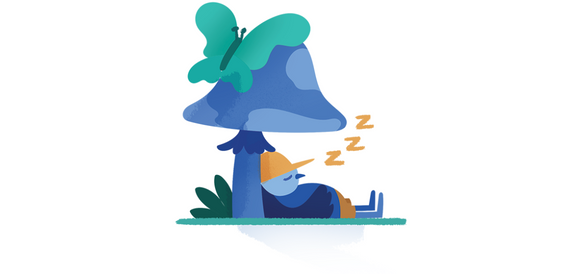

Other Teas
Because stress and anxiety can be caused for a variety of reasons, we also wanted to talk about certain teas that can help specific issues. We already shared teas that can help with the common flu or cold and stomach relief.
But we also wanted to share teas that can potentially help with problems such as inflammatory issues, stomach pains, and nausea. These issues can take a toll on your health physically but also mentally - anxiety and stress can strike as a result.
Here are some teas that may be beneficial in helping you deal with certain physical stressors.
Anti-inflammatory teas
Teas like chamomile and ginger tea are said to have anti-inflammatory properties.
Rose hip tea is also a potent tea that has anti-inflammatory properties. It’s made from the fruit of the rose plant. Rose hip tea is high in vitamin C and certain beneficial compounds; both work to provide an anti-inflammatory effect.
There are even studies that show the ability of rose hip powder to reduce the inflammation of people with rheumatoid arthritis and osteoarthritis. It’s also shown to reduce pain in such patients as well.
The anti-inflammatory properties of this plant may also help to fight skin aging. There was one study where participants took rosehip powder for 8 weeks. They found improved moisture and skin elasticity in the face of patients.
Teas for cognitive function and memory
Whether you believe it or not, your cognitive function and memory can certainly impact stress levels and anxiety. In fact.), cognitive impairment can lead to increased anxiety.
Sage tea could help with cognitive function and memory. There are a number of studies that are proving this to be true. It may even be effective against the plaques that are involved with Alzheimer's disease.
Some studies showed improvements in the cognitive function of those with Alzheimer's disease with sage drops/sage oil.
More studies also showed that sage may improve mood, memory in healthy adults and mental function.
Teas for bone health
Rooibos tea is a tea that comes from South Africa, and it may benefit bone health. One study actually shows that rooibos tea, green tea, and black tea stimulate cells involved with bone density and growth.
However, green tea is shown to be more effective compared to other teas when it comes to benefiting bone health.
This may be due to its ability to increase the activity of antioxidant enzymes. These enzymes act as a defense mechanism against oxidative stress-induced damage. This and its ability to decrease oxidative stress and proinflammatory meditators may be a reason it helps with bone health.
Nausea relief tea
You may get nauseous for a variety of reasons. Maybe you’re not a big fan of airplanes, or heights, or you’re simply not feeling well.
Of all the teas we’ve shared in this article, these are the best teas that can help relieve nausea:
- Fennel tea
- Ginger tea
- Licorice tea
- Chamomile tea
- Peppermint tea
- Honey lemon tea
- Peppermint tea
Conclusion
We’ve covered a lot in this article. It’s clear herbal tea, and some of the other teas out there provide many health benefits. From chamomile tea to rosehip tea, there's no shortage of options to choose from. So whether you deal with generalized anxiety disorder, your sleep quality is suffering, or you're looking to reduce anxiety in general and reduce stress, drinking tea may be a great option for you.
Between the recipes we shared and the benefits of certain teas, we hope you learned something new today. Be sure to share this with a friend, colleague, or family member who you think could benefit from using a tea blend and learning more about the benefits of tea!














